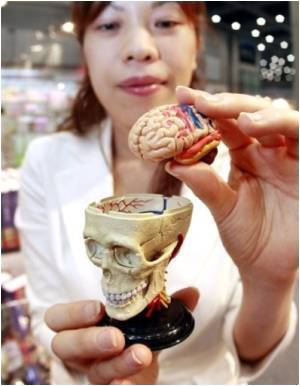
The finding may be useful in providing more highly individualized disease prognosis in the future. It may also help researchers understand which patients will respond to therapy with vitamin D3 and curcumin, a chemical found in turmeric spice, both of which were shown in previous studies by this UCLA research team to help stimulate specific immune system cells to clear amyloid beta in a laboratory test.
In earlier research, the team showed that Alzheimer's patients may have a defect in messaging from the MGAT3 gene, which could help explain why this population cannot effectively clear amyloid beta.
In the current study, researchers used a blood-based biomarker to identify three abnormal ways of processing MGAT3 gene information, which could lead to different disease prognosis.
"Alzheimer's disease robs a person of identity and is a huge burden for families, caregivers and society," said study author Dr. Milan Fiala, a researcher at the David Geffen School of Medicine at UCLA and the Veterans Affairs Greater Los Angeles Healthcare System. "This is one of the first studies demonstrating the role of the immune system in helping track Alzheimer's disease prognosis and the impact of therapies."
For the study, scientists drew blood samples from 20 Alzheimer's disease patients and 20 healthy controls and then isolated critical immune cells from the blood called macrophages, which are responsible for gobbling up amyloid beta and other waste products in the brain and body.
Advertisement
Based on the results, the researchers identified three groups of Alzheimer's patients.
Advertisement
Type I patients: This group also had low expression of MGAT3 and low amyloid beta absorption rates, but the strength of the MGAT3 message and the absorption of amyloid beta increased when researchers stimulated the macrophages with synthetic curcumin.
Type II patients: This group initially had high amyloid beta absorption rates, but when scientists added synthetic curcumin, MGAT3 expression lessened and absorption was reduced.
In addition, researchers found that for Type I and Type II patients, the clearing of amyloid beta was dependent on vitamin D3, a type of vitamin D that occurs naturally in these cells. When they blocked vitamin D3 use by the macrophages in the laboratory, they found that absorption of amyloid beta suffered.
"These findings demonstrate three very different levels of immunity and possible reactions to natural therapies of vitamin D3 and curcumin," Fiala said. "These differences could point to a new way to track the progression of Alzheimer's disease and the effectiveness of these natural therapies based on an individual patient's immunity."
The study has been published online in the Journal of Alzheimer's Disease.
Source-ANI












